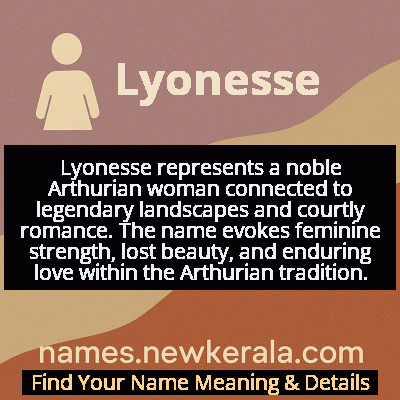Lyonesse Name Meaning & Details
Origin, Popularity, Numerology Analysis & Name Meaning of Lyonesse
Discover the origin, meaning, and cultural significance of the name LYONESSE. Delve into its historical roots and explore the lasting impact it has had on communities and traditions.
Name
Lyonesse
Gender
Female
Origin
Arthurian
Lucky Number
6
Meaning of the Name - Lyonesse
Lyonesse represents a noble Arthurian woman connected to legendary landscapes and courtly romance. The name evokes feminine strength, lost beauty, and enduring love within the Arthurian tradition.
Lyonesse - Complete Numerology Analysis
Your Numerology Number
Based on Pythagorean Numerology System
Ruling Planet
Venus
Positive Nature
Harmonious, responsible, caring, and artistic.
Negative Traits
Overly idealistic, superficial, possessive, or jealous.
Lucky Colours
Pink, turquoise.
Lucky Days
Friday.
Lucky Stones
Diamond, turquoise.
Harmony Numbers
2, 3, 9.
Best Suited Professions
Artists, musicians, teachers, healthcare workers.
What People Like About You
Warmth, nurturing nature, artistic flair.
Famous People Named Lyonesse
Lyonesse (Arthurian Legend)
Noblewoman and Literary Character
Wife of Sir Gareth in Arthurian romance, representing ideal courtly love and feminine nobility
Lyonesse as Literary Inspiration
Cultural Archetype
Inspired numerous fantasy writers and feminist reinterpretations of Arthurian women
Lyonesse in Modern Retellings
Fictional Character
Revived in contemporary Arthurian adaptations as a symbol of strength and autonomy
Name Variations & International Equivalents
Click on blue names to explore their detailed meanings. Gray names with will be available soon.
Cultural & Historical Significance
As a character, Lyonesse appears in Thomas Malory's 'Le Morte d'Arthur' as the noblewoman who becomes Sir Gareth's wife after he proves himself through chivalric deeds at her Castle Perilous. Her story embodies the medieval ideals of courtly love, where the lady serves as both inspiration and reward for knightly virtue. However, modern interpretations have increasingly emphasized her agency and intelligence, portraying her not merely as a passive prize but as an active participant in determining her own destiny. This dual nature—as both mythical land and noble woman—makes Lyonesse a rich cultural symbol connecting landscape, femininity, and the enduring power of legend.
Extended Personality Analysis
Lyonesse is characterized by a distinctive blend of aristocratic grace, intellectual depth, and quiet determination. As the lady of Castle Perilous, she demonstrates significant autonomy and judgment, carefully evaluating potential suitors for both martial skill and genuine chivalric character. This suggests a woman of considerable discernment who values substance over superficial displays of prowess. Her personality reflects the medieval ideal of noble womanhood while also containing elements that resonate with modern conceptions of strength and independence.
Beyond her role as Gareth's beloved, Lyonesse exhibits qualities of loyalty, wisdom, and emotional intelligence. She understands the complexities of court politics and human relationships, making her an effective partner rather than merely a decorative consort. Modern characterizations often emphasize her resilience and inner strength, qualities that align with the symbolic weight of the sunken land that shares her name. This combination of traditional feminine virtues with underlying fortitude and intelligence creates a multidimensional personality that continues to inspire contemporary interpretations of Arthurian women as active, complex figures rather than passive archetypes.
Modern Usage & Popularity
In contemporary naming practices, Lyonesse remains an uncommon but meaningful choice, primarily selected by parents with interests in Arthurian legend, Celtic mythology, or literary names. The name enjoys periodic use in English-speaking countries, particularly among families seeking distinctive names with historical resonance and feminine strength. While it rarely appears on mainstream baby name charts, Lyonesse maintains a consistent presence in communities interested in fantasy literature, historical names, and Celtic heritage. Its usage often reflects a desire to honor Arthurian traditions while choosing a name that stands apart from more common alternatives like Guinevere or Morgan. The name's rarity adds to its appeal for parents seeking unique options with deep cultural and literary connections, though its complexity and unfamiliarity to general audiences limit its widespread adoption.
Symbolic & Spiritual Meanings
Lyonesse carries profound symbolic significance derived from its dual identity as both a legendary sunken kingdom and a noble Arthurian woman. The lost land represents themes of memory, nostalgia, and the inevitable passage of time that transforms even the most glorious civilizations. This connects to broader human experiences of loss, change, and the persistence of memory and legend beyond physical existence. As a feminine name, Lyonesse symbolizes hidden strength, enduring grace, and the power that remains potent even when not immediately visible—much like the mythical land believed to lie beneath the waves.
The combination of these meanings creates a rich symbolic tapestry around resilience, legacy, and the idea that true value often exists beneath surface appearances. Lyonesse suggests someone who carries ancient wisdom and quiet authority, capable of weathering profound changes while maintaining core identity and strength. The name evokes the romantic melancholy of lost glory while simultaneously affirming the enduring power of love, memory, and cultural legacy—themes that resonate deeply in both Arthurian tradition and contemporary understandings of personal and historical identity.

